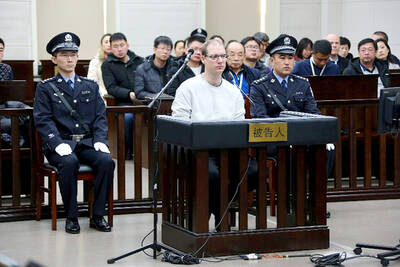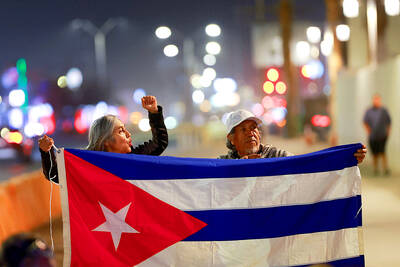Edward Snowden, the former US intelligence contractor who has been leaking information about government data collection programs, said on Friday before a debate on state surveillance that entire populations, rather than just individuals, now live under constant surveillance.
Snowden, who appeared via video link at Toronto’s Roy Thomson Hall during the semi-annual Munk debate, said that state surveillance today is a euphemism for mass surveillance.
“It’s no longer based on the traditional practice of targeted taps based on some individual suspicion of wrongdoing,” Snowden said in the brief video. “It covers phone calls, e-mails, texts, search history, what you buy, who your friends are, where you go, who you love.”
The video was screened as two of the debaters — former US National Security Administration (NSA) director General Michael Hayden and well-known civil liberties lawyer and Harvard law professor Alan Dershowitz — argued in favor of the debate statement: “Be it resolved state surveillance is a legitimate defense of our freedoms.”
In opposition were Glenn Greenwald, the journalist whose work based on the Snowden leaks won a Pulitzer Prize last month, and Alexis Ohanian, the cofounder of social media Web site reddit.
The Snowden documents, first leaked in June last year, revealed that the US government has programs in place to spy on hundreds of millions of people’s e-mails, social networking posts, online chat histories, browsing histories, telephone records, telephone calls and texts.
“Nearly everything a typical user does on the Internet,” in the words of one leaked document.
Greenwald opened the debate by condemning the NSA’s own slogan, which he said appears repeatedly throughout its own documents: “Collect it all.”
“What is state surveillance? If it were about targeting in a discriminate way against those causing harm, there would be no debate,” Greenwald said. “The actual system of state surveillance has almost nothing to do with that. What state surveillance actually is, is defended by the NSA’s actual words, that phrase they use over and over again: ‘Collect it all.’”
Hayden and Dershowitz spent the rest of the hour-and-a-half denying that the pervasive surveillance described by Snowden and Greenwald even exists and that the ongoing surveillance programs are necessary to prevent terrorism.
“Collect it all doesn’t mean collect it all!” Hayden said, drawing laughs from the audience.
Greenwald went on to spar with Hayden and Dershowitz over whether the current method of metadata collection would have prevented the terrorist attacks on Sept. 11, 2001.
While Hayden argued that intelligence analysts would have noticed the number of calls from San Diego to the Middle East and caught the terrorists who were living inside the US illegally, Greenwald argued that one of the primary reasons US authorities failed to stop attacks is because they were taking in too much information to accurately sort through it all.
Before the debates began, the audience voted 33 in favor of the statement: “Be it resolved state surveillance is a legitimate defense of our freedoms,” while 46 percent voted against. The debate ended with 59 percent of the audience siding with Greenwald and Ohanian.
The Munk debates are a Canadian charitable initiative established by cofounders Melanie and Peter Munk. Peter Munk is chairman and founder of the mining company Barrick Gold.

China’s military news agency yesterday warned that Japanese militarism is infiltrating society through series such as Pokemon and Detective Conan, after recent controversies involving events at sensitive sites. In recent days, anime conventions throughout China have reportedly banned participants from dressing as characters from Pokemon or Detective Conan and prohibited sales of related products. China Military Online yesterday posted an article titled “Their schemes — beware the infiltration of Japanese militarism in culture and sports.” The article referenced recent controversies around the popular anime series Pokemon, Detective Conan and My Hero Academia, saying that “the evil influence of Japanese militarism lives on in

DIPLOMATIC THAW: The Canadian prime minister’s China visit and improved Beijing-Ottawa ties raised lawyer Zhang Dongshuo’s hopes for a positive outcome in the retrial China has overturned the death sentence of Canadian Robert Schellenberg, a Canadian official said on Friday, in a possible sign of a diplomatic thaw as Canadian Prime Minister Mark Carney seeks to boost trade ties with Beijing. Schellenberg’s lawyer, Zhang Dongshuo (張東碩), yesterday confirmed China’s Supreme People’s Court struck down the sentence. Schellenberg was detained on drug charges in 2014 before China-Canada ties nosedived following the 2018 arrest in Vancouver of Huawei chief financial officer Meng Wanzhou (孟晚舟). That arrest infuriated Beijing, which detained two Canadians — Michael Spavor and Michael Kovrig — on espionage charges that Ottawa condemned as retaliatory. In January

A sign hanging from a rusty ice-green shipping container installed by Thai forces on what they say is the border with Cambodia reads: “Cambodian citizens are strictly prohibited from entering this area.” On opposite sides of the makeshift barricade, fronted by coils of barbed wire, Cambodians lamented their lost homes and livelihoods as Thailand’s military showed off its gains. Thai forces took control of several patches of disputed land along the border during fighting last year, which could amount to several square kilometers in total. Cambodian Kim Ren said her house in Chouk Chey used to stand on what is now the Thai

NEW RULES: There would be fewer school days, four-day workweeks, and a reduction in transportation services as the country battles a crisis exacerbated by US pressure The Cuban government on Friday announced emergency measures to address a crippling energy crisis worsened by US sanctions, including the adoption of a four-day work week for state-owned companies and fuel sale restrictions. Cuban Deputy Prime Minister Oscar Perez-Oliva Fraga blamed Washington for the crisis, telling Cuban television the government would “implement a series of decisions, first and foremost to guarantee the vitality of our country and essential services, without giving up on development.” “Fuel will be used to protect essential services for the population and indispensable economic activities,” he said. Among the new measures are the reduction of the working week in